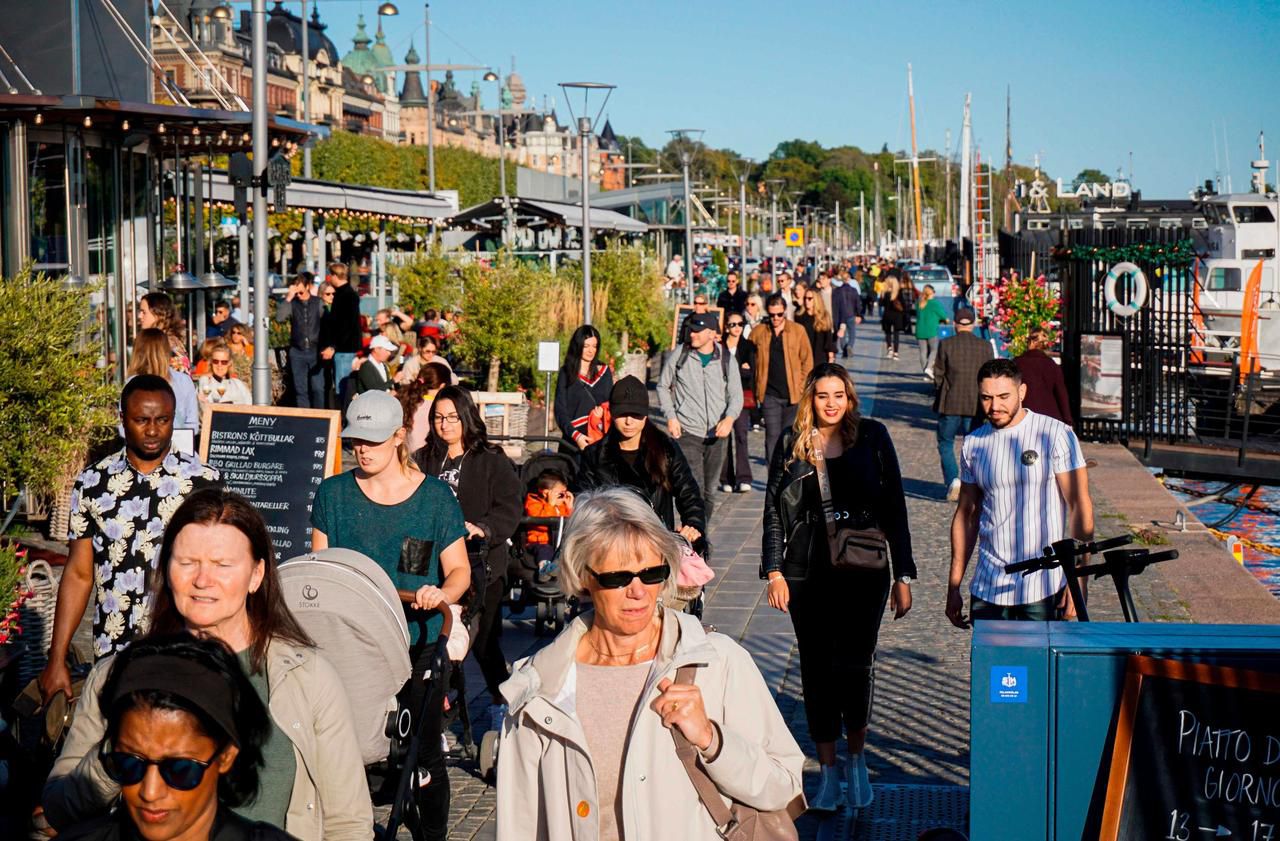Is the Swedish management of the Covid-19 epidemic exemplary?
This is what one could understand by seeing the rather low infection figures in the country, while a good part of Europe faces, in this month of September, a resurgence of contaminations - and establishes new restrictions. .
A surprising result, since Sweden is one of the rare European countries not to have imposed strict confinement, and that it still does not impose, today, the wearing of masks outside health establishments.
But the success of this apparently “laissez-faire” strategy is, in fact, much more nuanced, and can be explained by the local culture.
At first glance, the situation in Sweden is enough to make those who have had a hard time with the strict French, Italian or Spanish confinements dream.
In Sweden, only gatherings of more than 50 people have been prohibited by the political authorities.
Concretely, no confinement has been imposed on the Swedes.
The schools remained open.
Shops, bars and restaurants were allowed to accommodate customers.
All this without checks or fines.
No confinement imposed but a reduced life
This does not mean, however, that the Swedes have all freely met and massed in the office and in theaters.
“In fact, Sweden has confined its country and its economy, but in a different way from other countries.
Its approach is self-containment: the country has taken no political decision, apart from banning gatherings and closing schools beyond the age of 16.
All of the other measures have not been the subject of regulations or decrees ”, confides Antoine Flahault, epidemiologist and director of the Institute for Global Health at the Faculty of Medicine of the University of Geneva.
Covid-19: why Sweden does not impose the wearing of masks
It is the Swedish Public Health Agency (PHA), the equivalent of Public Health France, which provided recommendations on social distancing, teleworking, or the protection of the elderly, seen as more fragile.
“The planes were able to continue to fly, but for lack of passengers, it stopped.
80% of motorway traffic has been reduced.
The attendance was around 25% in the bars.
Many non-essential businesses have been closed, not by decree, but for lack of customers, ”explains Professor Flahault.
"Most of the health measures were voluntary, but they were followed by the public", confirms the Swedish epidemiologist Jonas Ludvigsson, in his study analyzing the course of the Swedish strategy over the first eight months of the epidemic , published this Monday.
An “effective” long-term strategy
How to explain such an application of measures without threat of fine, or punishment, as in France or among its neighbors?
"This is mainly due to the great confidence placed by the public in the government, its health agencies", justifies the specialist.
“A survey carried out in May 2020 noted that 80% of those polled had high or moderate confidence in the Swedish health system and the Public Health Agency,” he adds.
Newsletter - Most of the news
Every morning, the news seen by Le Parisien
I'm registering
Your email address is collected by Le Parisien to enable you to receive our news and commercial offers.
Learn more
It is thanks to this confidence that Anders Tegnell, the epidemiologist at the head of this agency, can maintain this strategy, which is considered unique in Europe, but which he considers satisfactory.
Today, the country has recorded a daily infection rate (between 150 and 300 since mid-August for 10 million inhabitants) much lower than that of France (from 3,000 to 14,000 cases over the same period, a figure 20 to 47 times higher, for nearly seven times more inhabitants) and its neighbors.
What also convince the Swedish public, like other experts, on the question.
“Since it is in everyone's interest to protect themselves and those they love from the virus, it seems to me that educating and trusting people in their ability to be responsible for their own safety is a good thing. strategy for surviving a pandemic, ”assures sociologist Charlotta Stern, professor at Stockholm University, who has notably studied the management of the country's health crisis.
“This strategy is effective, since it has made it possible to avoid a collapse of our health care system, and, at the same time, to keep our schools open.
In the long term, this is the right strategy for Sweden, ”agrees Jonas Ludvigsson.
Would this strategy have also made it possible to acquire a stronger collective immunity than elsewhere?
"Collective immunity has in any case never been an objective for the authorities," he recalls.
Many deaths
He admits, on the other hand, that there have been some failures in the Swedish management of the crisis.
Today, Sweden has more than 5,800 deaths, which ranks it among the hardest-hit countries when compared to its number of inhabitants.
Most of these deaths occurred in the spring, at the height of the crisis, and the victims were largely elderly.
“We were not in the right conditions and did not have the right qualifications to protect the elderly, especially those in retirement homes,” says Jonas Ludvigsson.
A problem encountered in many other countries overwhelmed by the epidemic over the same period.
However, today, this strategy "no decrees, only individual recommendations" - which, on certain points, also joins that of many Asian democracies, such as Japan, South Korea, Taiwan or Singapore, according to Antoine Flahault - is closely scrutinized in the rest of the world.
"Most countries today are interested in some kind of combination between the Swedish approach and the German approach, which has much more promoted testing strategies and barrier measures, such as wearing a mask," assures him. professor, based in Switzerland.
READ ALSO>
Coronavirus: for the WHO, Europe is entering a decisive phase
Be careful though: these approaches could be applied differently depending on the populations.
“It cannot be decreed, it requires trust in the population and preparation, acculturation, which cannot be invented in two days.
The politician cannot decide that the strategy will henceforth be self-containment, even if he dreams of it.
Having the support of the population is organized with the support of scientific authorities ”, warns the professor.
He also reminds that at any time the situation, and the decisions taken in Sweden, can change - like everywhere else.
“History will tell us if the Swedish approach was the right one,” concludes Jonas Ludvigsson in his study.






/cloudfront-eu-central-1.images.arcpublishing.com/prisa/OOLBKF5K4VFN7EA7IFFA4PMVUE.jpg)








